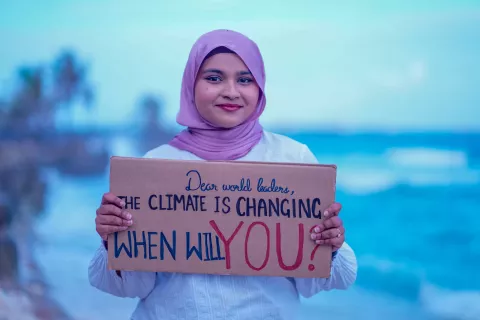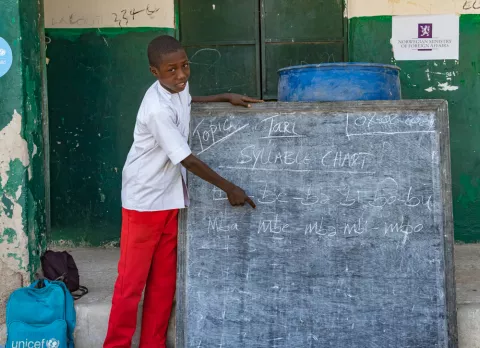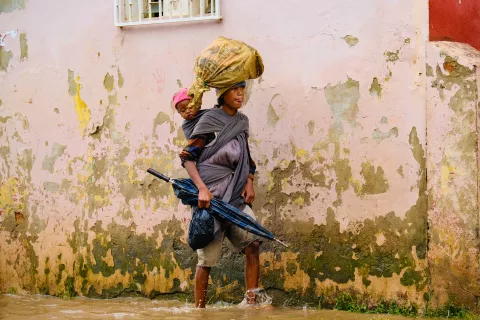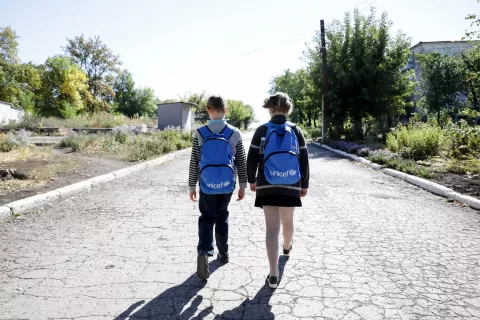TAUNGGYI, Myanmar – Thae Thae Su Aung, 14, knows what she wants for her future. "I want to go to school, study hard and become a doctor my family can depend on," she says. "My sister and mother are frail and have chronic illnesses, so I want to help them."
Yet, like many adolescents in Myanmar, Thae Thae Su Aung had to stop her learning first due to the COVID-19 pandemic and then due to armed conflict. As a result, she was out of formal education for two years and now lives in a camp for displaced people in Shan State, in the north of the country.
Before the security situation deteriorated, Thae Thae Su Aung lived with her family in Demoso Town in the eastern state of Kayah, where she finished 6th Grade. However, Thae Thae Su Aung explains that after the armed conflict intensified in July 2021, a friend of her mother's, already living in the camp, suggested they would be safer there than in Demoso Town.
I was losing direction in my life.
Thae Thae Su Aung and her family fled their home and sought refuge in the camp, which is located in a monastery. At first, Thae Thae Su Aung was not in school, so she volunteered with her mother at the camp. "I was losing direction in my life," Thae Thae Su Aung shares. Then, she heard about the 11-month UNICEF-supported life-skills course, the Extended and Continuous Education and Learning (EXCEL) programme.
The EXCEL programme targets out-of-school adolescents aged 10-17, many of whom have been affected by armed conflict. EXCEL aims to improve their literacy skills while also covering a wide range of topics, including personal safety, drug abuse, reproductive health, HIV prevention, and psychosocial competencies to build confidence, resilience, and decision-making skills. Participants also learn other transferable skills, such as digital, job-specific and entrepreneurial skills, preparing them for the job market.

It is late morning, and Thae Thae Su Aung has finished her lessons. After seeing her sit studiously in the front of the classroom and interact with her teacher and peers, I was curious to speak with her to learn about her dreams and aspirations. Thae Thae Su Aung shares with me how EXCEL has taught her new skills, but also prevented her from sinking into depression. "I used to be the naughtiest one at home and I was selfish," she tells me. "If I had continued like that, I might have gone astray. I might have stayed depressed as I had no opportunity to learn."
I'm happy now that I can learn again.
I ask her how she has changed. "The difference between before and after joining this training is that I am more polite," she says, smiling at me. "I'm happy now that I can learn again."
I think having a multiple flexible pathway approach to education is essential, especially in countries like Myanmar, where many children and young people have faced disruptions in their education. Using flexible formal and non-formal pathways that meet children where they are, enables young people to access skill-building opportunities for school, life and work.

Last year, we reached 18,249 internally displaced school-aged children and out-of-school adolescents with early learning, basic education and skills programmes. I have witnessed how young people have benefitted from the EXCEL programme. The parents tell me their children are gaining knowledge and family relations have improved. Like Thae Thae Su Aung, the young people also tell me they appreciate the opportunity to learn life skills. For example, one youth recently told me he can now manage his own motorbike repair shop and has quit smoking.
However, the need for educational opportunities continues to be huge. According to UNHCR, as of 27 December 2022, some 85,855 people in Kayah State, where Thae Thae Su Aung is from, have been internally displaced by conflict. Thae Thae Su Aung is now one of the 55,119 internally displaced people in Shan South State. In both states, around 34 per cent of the displaced are children.
I wish there were more programmes like EXCEL in other areas.
I know how important education in emergencies is, as I have witnessed it in many different contexts. Before joining UNICEF in 2008, I worked for the UNHCR in northern Rakhine State. Then in 2008, I joined UNICEF when Cyclone Nargis hit, devastating the Delta (Ayeyarwady) region, where I am originally from. Since 2016, I have been based in UNICEF's Taunggyi field office in Shan State as an education specialist.
Sal Mya, 27, the facilitator who invited Thae Thae Su Aung to join the EXCEL programme also had her education disrupted by conflict. Sal Mya tells me that she volunteered at the camp, helping in the kitchen and collecting camp data when a Karuna Myanmar Social Solidarity (KMSS) NGO member invited her to be a facilitator for the EXCEL programme. So naturally, Sal Mya was keen to be involved. "I didn't have much (teaching) experience, but before the conflict, I helped teach out-of-school children from nearby villages."
Thein Than Tun is an Education Specialist at UNICEF, Myanmar.

Following three nine-day training sessions, Sal Mya began teaching the EXCEL programme. "These children are bright and follow the course materials, and they are active and participate during the classes," she shares with me.
Sal Mya has already seen EXCEL's positive impact on the students and their families. "The parents are glad their children can continue learning, and they also say there are fewer conflicts between family members after their children joined the programmes," says Sal Mya. "I wish there were more programmes like EXCEL in other areas, such as in my village." I agree with her. After spending hours at the camp monitoring the EXCEL programme, I hope that more children like Thae Thae Su Aung have a chance to develop their skills despite their challenges.





